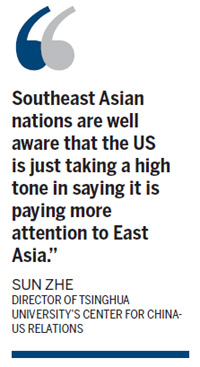|
|||||||||||
BEIJING - As the United States and Russia plan to make their debut appearances at the East Asia Summit on Friday, various reports are predicting that a far-reaching geopolitical change will occur in the region.
Some experts, though, note that both countries lack strong business ties to the region and have placed their priorities for foreign policy elsewhere. For that reason, they say it is unlikely the US and Russia will try to use the forum as a way to influence the form that cooperation takes in East Asia.
|
 |
"Southeast Asian nations are well aware that the US is just taking a high tone in saying it is paying more attention to East Asia, rather than taking steps such as directing more business investments there or taking up serious responsibilities," said Sun Zhe, director of Tsinghua University's center for China-US relations.
Seeing the debt troubles in Europe and the lingering troubles in the US, members of the Association of Southeast Asian Nations (ASEAN) are investing more and more in China, he said.
"Because of security concerns, some nations welcome US intervention in the region to counterbalance China," Sun said.
"But I know all of the countries here, including the Philippines - which has been the most adamant in the South China Sea issue - do not want to see the troubles escalating."
Chandra Muzaffar, an International Affairs analyst from Malaysia, believes ASEAN members may have been more or less manipulated by the US.
"I don't think it is good for ASEAN to be so closely linked to the US, because Washington has its own agenda as far as this region is concerned," Muzaffar, a professor of global studies at the Science University of Malaysia, was quoted as saying by Xinhua News Agency.
"Because of ASEAN's connections with the US, you find a lot of its countries are spending a great deal on their militaries and have become more militarized. They are trying to be provocative because someone is pushing them in that direction and failing to recognize that these issues can be resolved through peaceful dialogues."
He said China has shown it can work with ASEAN to overcome difficulties. As an example of that ability, he cited the Chiangmai initiative, which was an arrangement allowing the 10 members of the association, as well as China, Japan and South Korea, to swap currencies among themselves.
It came about as a rescue response to the 1997 financial crises in Southeast Asia. Its purpose was to ensure there would be short-term liquidity in the region.
"China has tangible ways to stand by ASEAN," Chandra said. "In the 1997 financial crisis, China could have devalued the renminbi in an economic sense. But the Chinese did not because they were concerned about the economies in the ASEAN countries.
"ASEAN should value independence and sovereignty to avoid becoming a tool for the interests of someone else and their agenda."
In the US, media outlets are challenging US President Barack Obama's statements indicating the country's foreign policy will "pivot" away from Iraq and Afghanistan and toward East Asia.
"The United States is, and always will be, a Pacific power," Obama said at a news conference on Monday in Hawaii.
As for Russia, another world power coming to the East Asia Summit this weekend, Sun said the country is paying more attention to business within the region.
"Of course, Russia is also aiming at counterbalancing the growing US presence here and avoiding being marginalized in the Fast East," he said. "But with its financial capability, Moscow still has room to play a leading role at the forum."
Hot Topics
HIV/AIDS, Egypt protest, Thanksgiving, climate change, global economic recovery, home prices, high-speed railways, school bus safety, Libya situation, Weekly photos
Editor's Picks

|

|

|

|

|

|







